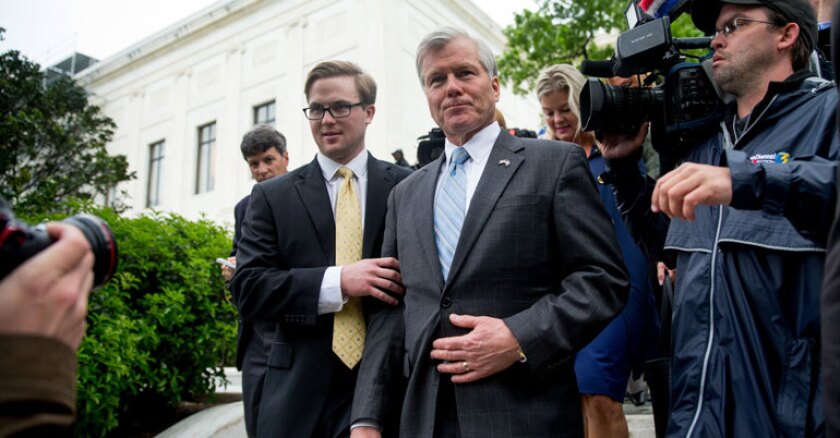All of this is happening on fast forward in Virginia, where former Gov. Bob McDonnell was convicted of corruption for accepting $177,00 from a health product manufacturer wanting favors from the state. The U.S. Supreme Court overturned his conviction on Monday. But before the ruling, legislators felt they had to do something. The law they enacted last year, however, was dismissed by good-government advocates as an insincere exercise in saving face. “There was a deliberate attempt by some folks to do a window-dressing type ethics reform bill,” says state Rep. Marcus Simon. “It looks like you’re doing something, but when you peek behind the curtain, there’s nothing much there.”
The new rules put a cap of $100 a year on gifts from lobbyists. But the package offered plenty of loopholes. The argument was made that because Virginia has a part-time, lightly paid legislature, lawmakers shouldn’t be subject to penalty if they inadvertently accept goods or favors for legitimate reasons. A group called ProgressVA examined all the gifts legislators had received and disclosed the year before the law passed. They found that if the new rules had been in place, 79 percent of them would have been acceptable.
In other words, the status quo was barely changed. Since the law was enacted, the loopholes have grown even bigger. The state ethics council determined that tickets to widely attended events, such as football games, didn’t fall under the $100 cap. This was an issue because in January, Commerce Secretary Maurice Jones and a batch of state employees watched a football playoff game from a luxury box offered as a gift.
The council also decided that, while pricey presents from lobbyists and the companies that hire them are prohibited, gifts from political action committees are fine. “Dominion Power and its lobbyist are limited,” says Anna Scholl, executive director of ProgressVA, “but Dominion’s PAC or foundation is not.”
The ethics council -- on which gubernatorial appointees and legislators themselves sit -- hasn’t even hired a full-time director to staff its own operations. To the extent that lawmakers felt they could get away with taking gifts before McDonnell’s conviction, that hasn’t changed much. “A lot of state legislators don’t get nearly the scrutiny they should with respect to the question of ethics,” says Stephen Farnsworth, director of a center on leadership at the University of Mary Washington. “When you talk about Virginia and ethics law, it’s pretty clear it’s the wild, wild West.”
*This story has been updated from the print version to reflect the U.S. Supreme Court ruling.









